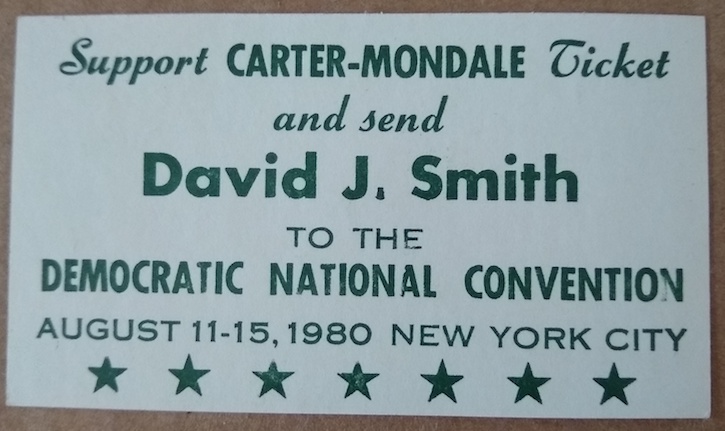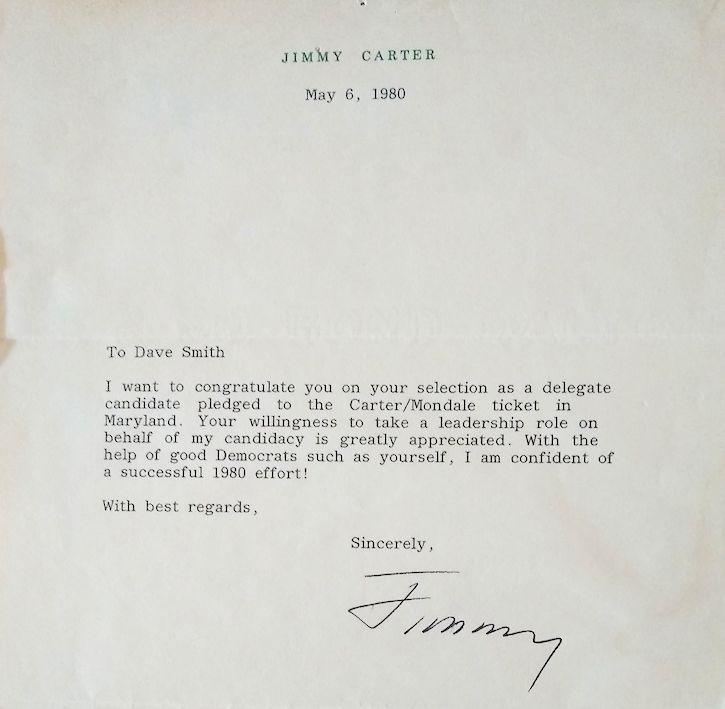Carter School adjunct faculty member and MS alum David Smith reflects on the impact of Jimmy Carter's legacy on his life and work.

By David Smith
I’ve never met Jimmy Carter.
Nevertheless, he was the first presidential candidate I voted for in 1980. At the time, I was a junior studying political science at American University in Washington.
As a D.C.-based college student, I had a front-row seat to the political world. 1980 was a difficult year for our country. The Iranian Hostage Crisis was the leading story every day, and the country was experiencing what President Carter characterized as a crisis of confidence in his national malaise speech of July 1979.
At American University, I was an active member of the College Democrats. Our chapter president went on to a career in Congress (Representative Jim McGovern of Massachusetts). Public service was a typical career pathway for many AU grads. At some point, I, too, expected to take that road, but I had also decided to first go to law school back home in Baltimore.
As a teen, I had lived through the Watergate period, spending the summers of 1973 and 1974 mesmerized by the televised hearings and the legal theatre. Spiro Agnew, Richard Nixon’s vice-president, resigned in October 1973. He had been Maryland’s governor and was a national embarrassment to us. Then Nixon resigned the following August, and Gerald Ford became president. When Georgia Governor Jimmy Carter emerged in 1976 as the standard bearer for the Democratic Party, he gave many young people—myself included—hope for a return to morality in public life.
Carter struck me as a man of high principle and honesty, so much so that when he ran for re-election in 1980, I wanted to do more than just vote. I decided to run as a delegate to the Democratic National Convention (DNC), which was to be held in New York City in August that year, so that I could vote with the Maryland delegation to renominate him for a second term.
But to get there, I would first need to face the Maryland Primary. By early spring in 1980, I had gone through all that was needed to qualify as a candidate: I was a registered Democrat living in Maryland (although AU was in D.C., I still claimed Maryland residence), and I had pledged to President Carter. But lurking in the background was one impediment I would need to resolve: the Hatch Act of 1939.
In the summer of 1979, I had returned to Baltimore and taken summer classes at a local community college while also working. I had secured a summer federal government job with the U.S. Despatch Agency (yes, it’s with an “e” not “i”), a U.S. State Department unit charged with arranging for the transportation of personal effects for the diplomatic community. My job was organizing bills of lading and other shipping documents. This was before the internet, of course, and our most sophisticated technology was a fax machine. The Baltimore office handled traffic to Africa primarily, so I got to know the capitals in Africa! I had planned to continue the job again in the summer of 1980.
The Hatch Act is a federal law enacted in 1939 that restricts government employee engagement in partisan elections. The law inoculates employees from partisan pressures to keep their jobs. In turn, employees are limited in how they are permitted to engage in political activities. Running for a partisan office is prohibited. Even as a temporary summer employee, the Hatch Act applied to me, and I had to choose between a well-paying summer job (which I needed, since I was putting myself through college) or attending the DNC.
I had already gone to great lengths to run, even printing my own materials to hand out at the polls, drawing on printing skills I had learned from my father, who was a letter pressman. Nevertheless, I ended up having to make the difficult decision to withdraw my candidacy.
I was disappointed. I had hopes of joining as part of the convention’s youth delegation and affirming Carter’s vision of America. But even though I was unable to run, I did walk away from the experience with a meaningful memento. In May, I received a letter from Jimmy Carter thanking me for my commitment and support.

Picture of a letter from Jimmy Carter to David Smith, dated May 6, 1980. The letter congratulates David Smith on his selection as a delegate candidate pledged to the Carter/Mondale ticket in Maryland.
This experience did not end my political aspirations. Later, I ran (unsuccessfully) for the Democratic State Central Committee and the Maryland legislature.
What’s more, though the experience may not have taken the shape I initially expected, it was transformative for me, especially at the start of my career. I am grateful that I have be able to follow Jimmy Carter’s work and career as president, his founding of The Carter Center in Atlanta, Georgia (which I have visited), and his being awarded the Nobel Peace Prize. His work in fashioning the Camp David Agreement, among other initiatives, is an important testament to his commitment to peace.
His work also would have a direct impact on my own contributions to the cause of peace. It was Jimmy Carter who in 1979 appointed the Matsunaga Commission that made recommendations for the creation of the U.S. Institute of Peace, where I went on to be employed for almost eight years.
The renaming of the School for Conflict Analysis and Resolution to the Jimmy and Rosalynn Carter School for Peace and Conflict Resolution represents a recognition of the important ways in which he has advanced peace as a central objective of U.S. foreign policy.
For me, the renaming also holds importance on a personal level, providing a symbolic connection to a man for whom I have huge respect and admiration. As now both a graduate of and adjunct at the Carter School, I feel my own work in peacebuilding and conflict resolution is itself being recognized and given significance as part of the school’s evolution.
The association of Jimmy Carter’s legacy with our work provides meaningful creditability at a time when peace and the associated notions of social justice, equality, and human rights—which have long been the central focus of the Carters’ work—are more important than ever before. In these last few weeks and months especially, we are daily seeking ways to pursue justice and fairness not only in public health contexts because of COVID-19, but also in the fair administration of the legal system, which too often remains elusive, as George Floyd’s death has reminded us.
The renaming of our school to the Carter School is the right thing at the right time, and I am proud to be part of that legacy.
